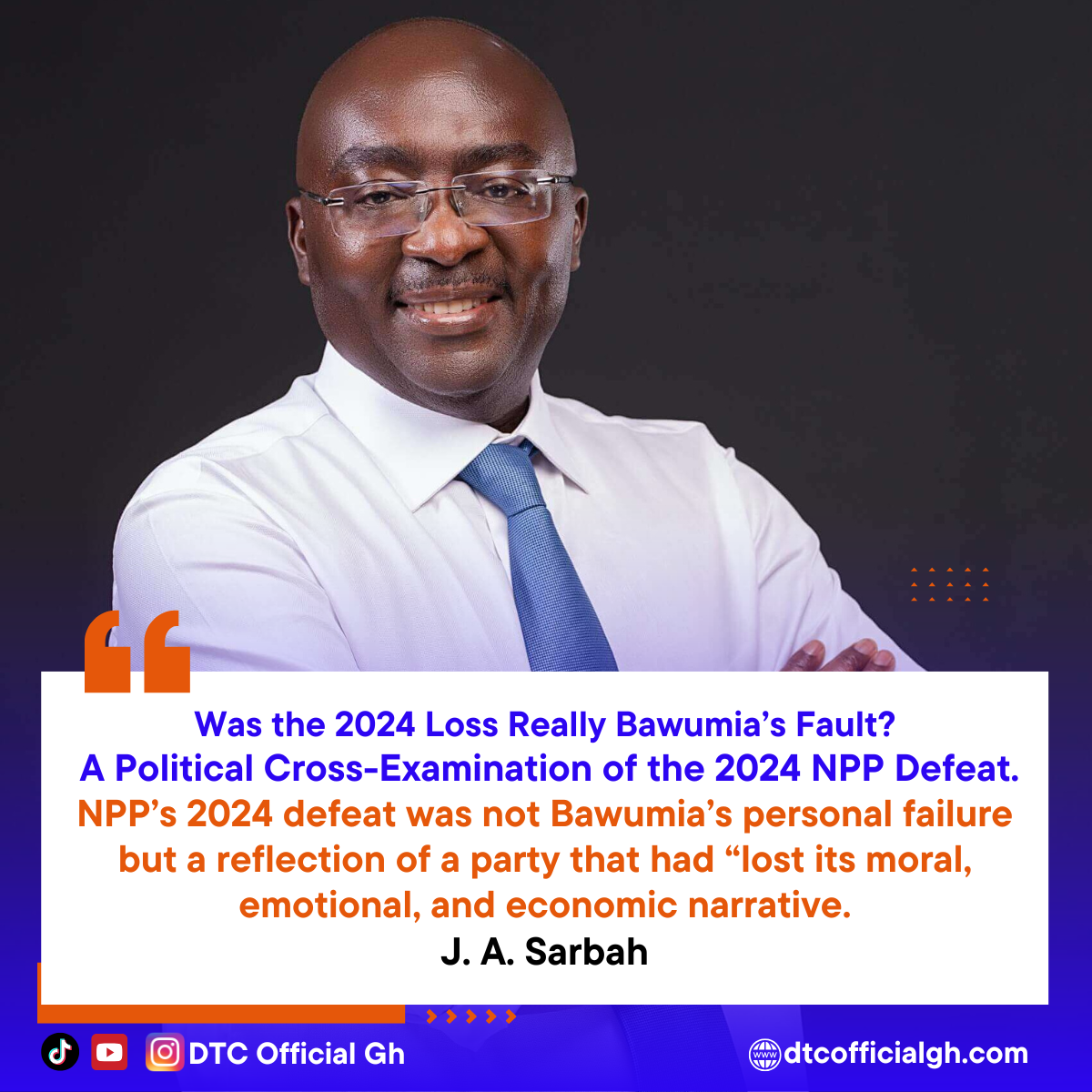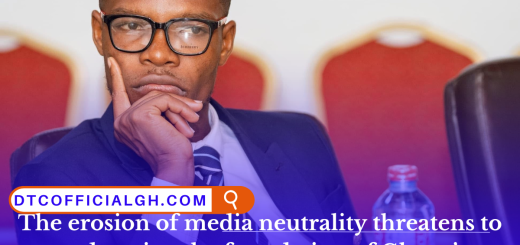Was the 2024 Loss Really Bawumia’s Fault?, J. A. Sarbah Questions the Fairness of Blame

In a thought-provoking political essay titled “Was the 2024 Loss Really Bawumia’s Fault? A Political Cross-Examination of the 2024 NPP Defeat,” political commentator J. A. Sarbah has sparked fresh debate on whether the New Patriotic Party’s (NPP) 2024 electoral loss was truly the fault of its flagbearer, Dr. Mahamudu Bawumia, or a symptom of deeper institutional decay within the party and government.
Sarbah’s piece, which has been widely circulated on social media, offers what he calls a “political autopsy”, dissecting layers of economic, structural, and moral failures that predated Bawumia’s campaign. His central thesis: Bawumia became the face of a storm he neither designed nor controlled.

The Economic Burden: “Voice Without Veto”
Sarbah argues that while Bawumia chaired the Economic Management Team, he did not wield the final authority over fiscal policies.
“The Finance Minister proposed; the President approved; the Cabinet decided,” he wrote, suggesting that Bawumia had “voice without veto, and visibility without control.”
According to him, Ghana’s economic challenges, inflation, cedi depreciation, and IMF austerity, were outcomes of collective decisions, not individual missteps. “When the global tide turned, he was crucified as Ghana’s economic villain,” Sarbah observed.
Corruption and the Burden of Perception
The essay also challenges the logic of associating Bawumia with corruption scandals that emerged under the NPP’s watch. Sarbah asks pointedly:
“Did he command the ministries where the rot allegedly festered, or was he, ironically, one of the few senior figures untouched by corruption allegations?”
He argues that Bawumia’s relative moral cleanliness became irrelevant in a system already tainted by public distrust.
MUST READ: Oliver Barker-Vormawor’s Bold Take on Power, Hope, and Neocolonial Influence
Eight-Year Fatigue and Voter Psychology
Sarbah references Ghana’s political trend since 1992, where ruling parties lose power after two terms, calling it an “eight-year fatigue cycle.” He insists that this historical rhythm, rather than individual failure, was a major factor in the 2024 outcome.
“Did Bawumia invent the constitutional rhythm of voter fatigue?” he quipped.
Youth Discontent and Structural Unemployment
Addressing youth frustration over taxes, unemployment, and the controversial E-Levy, Sarbah questions whether a vice president could have reversed long-standing economic imbalances or policy decisions not of his making.
“Could any candidate, entering months before an election, undo years of cumulative fiscal weight and still perform miracles at the polls?” he asked.
MUST READ: Exposure Is Not Enough: How Long, and To What?”
Internal Fractures and Sabotage
Sarbah’s essay also takes aim at the NPP’s internal discord. He blames the leadership’s neglect of the grassroots and the divisive rhetoric of figures like Kennedy Agyapong, whose public criticisms, he argues, damaged party unity and credibility.
“How does a candidate recover momentum when a senior party figure validates every opposition charge in real time?”
He also cites the controversial 2021 parliamentary speakership vote, where NPP MPs helped elect the NDC’s Alban Bagbin, as a key turning point that weakened the party’s legislative control and long-term economic agenda.
A Communication Crisis
The author claims that the government’s messaging machinery “collapsed under the weight of its own technicality,” leaving citizens alienated. He credits Bawumia for attempting to humanize the message, though he believes the damage had already been done.
“If ministers were explaining while citizens were complaining, how does that become the fault of the one candidate who actually tried to rebuild empathy?” Sarbah wrote.

A Verdict on the Party, Not the Candidate
In his closing argument, Sarbah states bluntly that the NPP’s 2024 defeat was not Bawumia’s personal failure but a reflection of a party that had “lost its moral, emotional, and economic narrative.”
“He walked into a battlefield already burning, expected to emerge spotless,” he concluded. “Until the party admits that, every new candidate will inherit the same storm, and the same unfair blame.”
For more insights and inspiring stories, kindly follow us on Twitter and WhatsApp.
Context and Reaction
Sarbah’s commentary has reignited public conversation about accountability within the NPP and Ghana’s broader political culture. Supporters of Bawumia have praised the piece as “the most honest reflection yet” of the 2024 loss, while critics argue that it attempts to absolve leadership of collective responsibility.
Nonetheless, “Was the 2024 Loss Really Bawumia’s Fault?” stands as one of the most piercing post-election analyses, not just of the NPP’s defeat, but of how power, perception, and blame intersect in Ghanaian politics.
Watch related discussions and political insights on DTC OfficialGh’s YouTube channel:




1 Response
[…] READ FULL: Was the 2024 Loss Really Bawumia’s Fault?, J. A. Sarbah Questions the Fairness of Blame […]